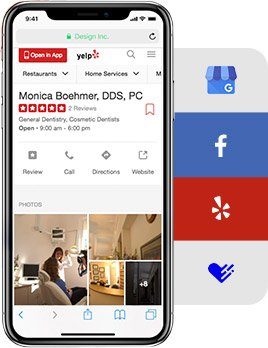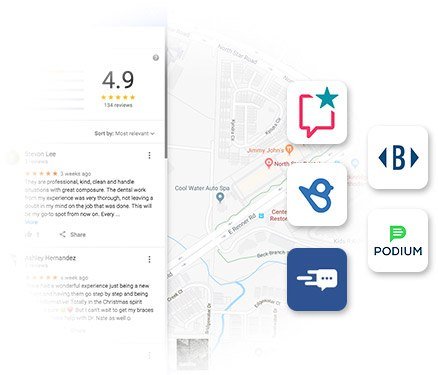Reputation Management for Dentists
Online Reviews – 2021 Best Practices, Tips & Recommendations
For most small businesses, online reviews are critical to their success. Dental practices are no exception. Accordingly, developing and implementing a proven, effective system for consistently getting at least two new reviews per month – every month – is critical to meeting your new patient goals.
To help you accomplish just this, we have put together a series of tips, techniques and ideas. Most of these are not original. In fact, they are “borrowed” through our close, working relationships with many of the most successful dental practices in the United States.
Of course, our team of reputation development experts is never more than a phone call or email away. We welcome the opportunity to answer any questions and to provide more customized ideas.
Most Important Online
Review Platforms for
Dentists
- Google My Business (GMB)
- Yelp
- Healthgrades
Best Software to “Help”
Request Reviews
- GatherUp
- BirdEye
- Sobox
- Broadly
- Podium
Online Reviews for Dentists FAQ’s
Reputation development can be both a mysterious concept and stressful situation for dental practices. You likely have a multitude of questions on how to get reviews, improve your online reputation, as well as the effect reviews can have on your business from both a patient-perspective in addition to SEO. Simply expand each of the questions below to reveal the answer!
How many reviews should I get per month?
While this number varies by practice, the absolute minimum should be one review per month. Ideally, this is at least one review per month on Google and another on Facebook. The “best” practices generate around one review per week.
At the same time, it is important to note a steady flow of reviews is more valuable than a bunch all at once. Getting 10 to 15 (or more) reviews all at once – then none for months – is not positive and might actually raise red flags at Google.
Does the number of reviews I have affect my rankings on Google?
Yes. There is no doubt the number of reviews – and the star ratings of those reviews – does impact your search rankings. How much? That is another question. It is not clear, but using a little common sense provides some perspective.
Google’s entire business depends on providing search results that are helpful to searchers. If someone is looking for a new dentist, they are going to be looking for someone with good reviews. A steady stream of positive, detailed reviews by genuine people will help a new patient make their decision. If a “new patient” values this information, Google’s search algorithm is very likely to do the same.
Should I respond to every review?
Yes. Many people only take the time to respond to negative reviews. Do not be like many other people. Be better. Take the time to personally, as the dentist, respond to every review with search-friendly content. By this, we mean crafting a response that includes at least one of the keywords important to your search optimization efforts. For example, if you are a cosmetic dentist in Springfield, use “cosmetic dentist” and “Springfield” in your response to reviews. You should also sign each review with your name.
Specifically, there are three benefits to this approach. First, potential patients like to see that you care enough to review and to respond to the reviews of other patients. Second, Google likes to see engagement. They like to see you take the time as well. Third, the content you enter in your response is indexed by Google. This content is just as valuable as the custom content we create for your website, and it can have a direct impact on your search results.
Is it OK to have a contest to “recognize” patients for leaving reviews?
No. Not really. Many practices do this, and very few get caught. However, “paying” patients to leave reviews is definitely against the established guidelines of Google, Yelp and others. For this reason, we recommend a different approach to “encouraging” your patients to leave reviews.
What are the best ways to get patients to leave reviews?
If you are serious about getting reviews and have extra money to spend, it probably makes sense to invest in one of the pieces of software (e.g., BirdEye) that helps you request reviews. At a minimum, these programs need to integrate with your practice management software. However, the software can be expensive and requires set-up, monitoring and maintenance.
If you are looking for a lower cost alternative, incentivize your staff. This does not violate any policies of Google (or any others), and it can be very effective. Set a goal for your practice – say 4 reviews per month on Google and/or Facebook – and make it a fun contest for your entire practice. For every month you hit your goal, do something fun. It could be a team lunch, or it could be a trip to get your nails done. Whatever the prize, patients will respond to a request from the hygienist or assistant they love, and you will get a steady flow of positive reviews.
Are their ways to “filter” negative reviews before they get to my Google My Business and Facebook pages?
Technically, yes. However, we do not recommend it. For many years, certain services have promoted their ability to “filter” negative reviews and to direct only positive reviews to your public platforms such as Facebook at Google. While cool, these services are misleading (at best). This is why Google and others recently took steps to remove reviews gathered through these platforms.
We agree with this decision. The simple fact is that honesty is the best policy. The best way to get “only positive” reviews is to provide an outstanding patient experience. In addition, these efforts will be rewarded through lots of patient referrals – the most cost-effective way to gain new patients.
What should I do if I get a negative review?
They are part of life. If you are doing a good job and treating patients fairly, you have nothing to worry about. Rational patients expect a negative review now and then. They realize some people can never be pleased. In these cases, the best way to “deal with” an isolated, negative review is to “bury” it with positive reviews from genuinely happy patients.
At the same time, a consistent flow of negative reviews might be telling you something. Read them objectively and make sure they are not pointing out a “real” issue at your practice. It might be a person or a policy. Or, it might just be a coincidence.
In the rare instance where you receive a dishonest or factually inaccurate review, we can help. Google and Facebook want accuracy – good or bad. If the person has never been a patient, the review services will listen. If there is something offensive or insulting in the comments, they will review them. This is where we can work on your behalf to appeal the review and to ask for them to evaluate the situation and circumstances.





